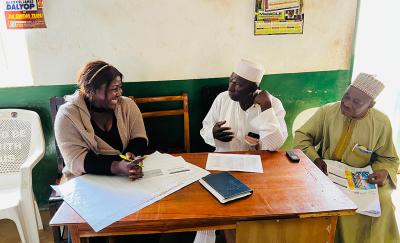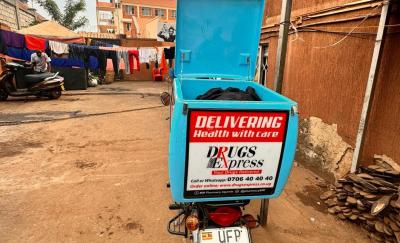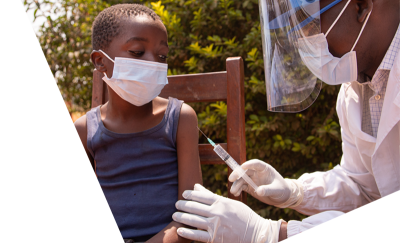Raising a Voice for Benin’s Private Health Sector


Mothers and children often lack basic health services in Benin. That leads to worsening health and preventable deaths among infants, schoolgirls, and women, particularly the extremely poor. An Abt-led USAID health assessment in 2013 found an underperforming private sector contributed significantly to the lack of high-quality reproductive, maternal, neonatal, and child health (RMNCH) services and products.
Benin’s Private Health Sector Platform (Plateforme du Secteur Privé de la Santé or PSSP) is helping to change this. Launched in 2014 based on a recommendation from Abt’s health assessment, PSSP plays an increasingly visible role as the sector’s primary advocacy group and chief interlocutor for the private sector with Benin’s Ministry of Health. PSSP is also a major partner to the Abt-led USAID Private Sector Health Partnership Activity (PSHPA)—which shares its goal to unite and strengthen the country’s private health sector.
Many Beninese, including 14 percent of women giving birth and 35 percent of those afflicted with malaria, seek health services from commercial and nonprofit providers. But the private sector has lacked the power and capacity to meet rising demand due to an unfavorable regulatory environment, uneven service quality, and spotty public awareness of products and services.
That’s where PSSP comes in. When it started, two USAID projects, including Abt’s Health Finance and Governance project, provided technical training and operational guidance. Since 2018, PSSP has partnered with PSHPA to raise the quality and availability of private RMNCH services and products, a huge step to reducing maternal and child deaths and improving health outcomes in Benin.


Embedded assistants mobilize action
PSHPA recruited technical assistants to work within PSSP on its institutional and organizational development and health business development. With this guidance, PSSP established an information intelligence team that captures, analyzes, and guides resource-generating opportunities, from a new e-learning platform for its members to off-grid solar power. PSHPA has also mentored PSSP on how to conduct financial audits, which show a funding pipeline of approximately $200,000 so far. Demonstrated funding is essential for attracting new business.
"They took the issue of self-determination of the PSSP seriously and stuck their necks out with us,” said PSSP’s executive secretary, Pascal Fafeh. “Without their input, we would not have the time to mobilize so many actors and technical capacities to jump on new opportunities.”
PSSP now represents 20 private sector health associations, up from zero in 2018, when its PSHPA partnership began. PSSP supports registration and accreditation for its members and advocates for changes in laws and regulations affecting the private sector. In addition to Abt, it holds contracts with other implementing partners, including Chemonics, and other donors including UNICEF and the Belgian development agency. PSSP’s impact on health outcomes and its analytical and auditing capabilities, among other things, are preparing PSSP to receive direct USAID funding—a major goal of the agency’s focus on localization.
PSSP also hosts annual Private Health Sector Days, bringing together hundreds of government officials and health professionals to spotlight this historically overlooked segment of the country’s health system. This event showcases private sector health achievements, explore challenges, and build relationships within the sector and with government attendees—all while reinforcing PSSP’s leadership. PSHPA looks forward to collaborating on one final Private Health Sector Day in May 2023 prior to the project’s close.
“The sharing of each member association’s main achievements, the informative and formative communications on the ongoing health reforms and on the associative governance contributed to the success of these days and reflect the strength of a ‘rainbow PSSP,’” said PSSP President Dr. Lucien Dossou-Gbete. “This undoubtedly induces a positive change of opinions on the PSSP and the private sector in the Beninese health system.”
Read More

Pathways to UHC: Nigeria’s State and Local Approaches to Financing Integrated HIV Services and Primary Health Care
Nigeria’s state and local government-driven approaches to integrated primary health care are transforming financial protection and access for vulnerable populations, setting a replicable model for sustainable universal health coverage.

Local Digital Innovation Improves Family Planning in Uganda
An LHSS grant helped a Ugandan pharmacy expand an e-Pharmacy platform to include more family planning (FP) products and train staff to provide FP counseling.

Global Health - June 2024
Stay informed with Abt's Global Health Newsletter for the latest in health systems strengthening and more.

Global Health Security Conference (GHS) 2024
Abt Global is sponsoring the Global Health Security Conference on June 18-21 in Sydney, Australia.